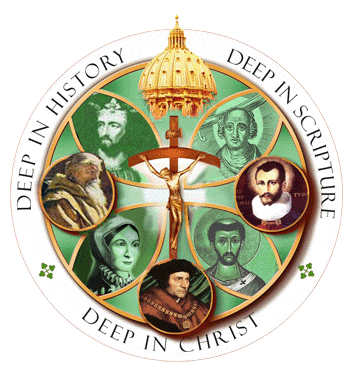
If the foundations are destroyed, what are the faithful to do?
~Psalms 11:3
That choice of scripture was fitting, as the very foundations of Catholicism in England were indeed destroyed during that tragic period, and the bulk of the conference dealt with how the faithful responded to the destruction and ensured the survival of Catholicism, much too often at the cost of martyrdom, in the British Isles.
So, what were these "foundations" that were destroyed at the English Reformation? Marcus enumerated them as follows:
(1) That Jesus intended there to be one (and only one) Church.
(2) The authority of Peter (the Pope as head of the Church).
(3) Apostolic succession and the authority of the Bishops.
(4) The importance of priests.
(5) A set of doctrines/creeds that were to be believed and which had been established by the hierarchy.
(6) An assumption that the role of Church leaders was to serve.
(7) A call to holiness.
(8) Poverty, chastity, and obedience.
(9) Internal conversion of the heart.
(10) A belief in blessings and curses.
Marcus concluded his opening remarks with the question: How do we apply the lessons of the Reformation to the need for renewal and reform in the Church today?
The State of the Church in England Before the Reformation - Dwight Longenecker
Dwight Longenecker did yeoman's work in in covering 1500 years of the history of Christianity in Britain in a little over an hour's time. Dwight's excellent presentation included a PowerPoint presentation with photos of his former Anglican parish on the Isle of Wight, an early 4th century Romano-British mosaic of Christ, and examples of early 4th century liturgical silverware that had been discovered in England.
I'm not going to try to cover the entire millenium-and-a-half in this blog entry as Dwight so capably did in his hour-long presentation, but I do want to highlight a couple of the points that he made.
First, that contrary to the romanticized notions and claims of those enamoured with "Celtic Christianity", the earliest Church in Britain was NOT Celtic in nature, but, in fact, Roman. It is very likely that Christianity was first brought to Britain by Roman soldiers and their slaves. There is extensive evidence of Roman-influenced Christianity for 2 or 3 centuries before Patrick's missionary work to the Irish. And that mission, itself, was one authorized and encouraged by the Pope.
Second, at the beginning of the 1500s, the Church in England was NOT afflicted with the problems associated with its Contintental counterpart, but rather was working from a position of relative strength. As evidence of this, Dwight pointed to the following items:
(1) The existence of a beautiful sacramental understanding of the social intercourse between the rich and the poor.
(2) Best-selling books of popular devotion.
(3) Generous last wills and testaments.
(4) The vital life of guilds and fraternities.
(5) Churches were in excellent repair, and there was actually new building taking place.
(6) A healthy number of vocations to the priesthood and the religious life.
(7) The relative health of clerical life.
(8) Investment in the future.
(9) A hatred of heresy, and a dislike of anything that smacked of new religion.
(10) A low level of corruption.
(N.B. I would have added England's place as "Our Lady's Dowry", the Blessed Virgin being a subject of much devotion both popular and official. Surprisingly, this fact was never mentioned once by any of the speakers at the conference.)
Again, Dwight is to be commended on an excellent presentation of some very challenging material. As an aside, Dwight was the very first person Sarah, Mary Virginia, and I met at the conference, when we were checking in at the front desk of the hotel.
The Schism: Influences from Henry VIII to Elizabeth - Msgr. Frank Lane
Monsignor Frank Lane focused on 2 approaches taken by Catholic clergy in England in response to the Elizabethan "accomodation" reflected in the Act of Conformity. In essence, Elizabeth attempted to bring about a state religion that "looked" Catholic from all outward appearances, but that was theologically Protestant. The effect of the Elizabethan accomodation was that religion was to become a cultural phenomenon rather than a spiritual one.
This accomodation came to an abrupt halt when the Pope excommunicated Elizabeth and with the coming of the Counter-Reformation priests. There were Catholic priests in England who objected to the disruption of the accomodation, and appealed to Rome for a cessation of the counter-reform efforts. They were known as the "Appellants".
Which brings me back to the main theme of Msgr. Lane's talk: the Appellants (accomodationists) vs. the Counter-Reformers. Msgr. Lane did an excellent job of wrapping up his talk by noting the similarities and applicability to what goes on in the Church today between those who, on the one hand, want the Church to accomodate itself to modernity, secularism, and "tolerance" and see Vatican II as a new starting point in the Church's history, and, on the other hand, those who, like Pope Benedict XVI speak of things like the "heremeneutic of continuity".
No comments:
Post a Comment
Note: Only a member of this blog may post a comment.